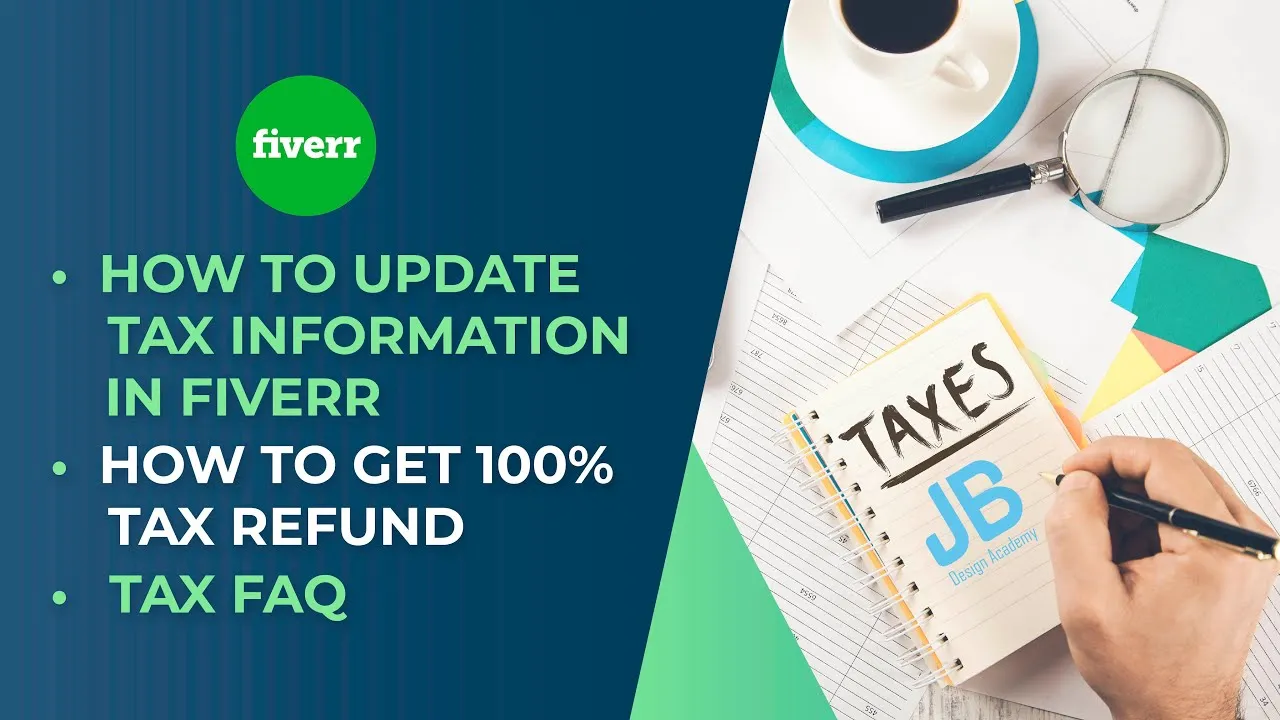Welcome to the gig economy, where platforms like Fiverr have revolutionized the way freelancers offer their services! Fiverr is a well-known marketplace that connects talented individuals with clients looking for specific services—from graphic design to writing and programming. But if you're using Fiverr in India, it's crucial to understand how your earnings are taxed. Service tax is an essential aspect of running your freelance business and impacts your income and pricing strategy.
In India, the taxation system can be a bit intricate, especially for freelancers and independent contractors. Service tax is one of the key components, and understanding how it applies to platforms like Fiverr can help you manage your finances better. As you navigate the world of online freelancing, you might ask, “How is my service tax calculated?” or “What do I need to report?” Let's delve deeper into the world of service tax on Fiverr in India.
2. Understanding Service Tax: A Brief Overview

Service tax is a form of tax that the government levies on specific services provided to clients. It's essential to grasp what it entails if you're a freelancer on platforms like Fiverr. Think of service tax as the government's way of collecting revenue from services rendered, much like how they collect tax on goods sold. Here’s a summarized breakdown:
- Applicable Services: Service tax generally applies to all services that fall under the definition of 'taxable services'. This includes a plethora of freelance services.
- Rate of Tax: The standard service tax rate was previously 14% but has undergone changes with the implementation of GST (Goods and Services Tax). Currently, most services are taxed under the GST regime, which has a 18% tax rate for most freelance activities.
- Threshold Limit: In India, if your annual turnover exceeds ₹20 lakhs (or ₹10 lakhs in special category states), you are required to register for GST and charge your clients accordingly.
Here’s a quick table showing the service tax vs. GST comparison:
| Aspect | Service Tax | GST |
|---|---|---|
| Tax Rate | 14% | 18% |
| Applicability | Specific services | All goods and services |
| Threshold Limit | Varies (based on service) | ₹20 lakhs |
To recap, understanding service tax and its implications is crucial for freelancers on Fiverr in India. By being informed, you can ensure compliance, plan your pricing better, and keep your hard-earned money where it belongs—in your pocket!
Also Read This: How to Put Spaces Between Fiverr Profile Paragraphs
Taxation Structure for Freelancers in India

Taxation for freelancers in India can seem a bit overwhelming at first, but once you break it down, it starts to make sense. Freelancers are categorized under the Goods and Services Tax (GST) regime, which applies to most services offered. Let’s simplify this structure.
Here’s a quick breakdown of the tax structure:
- Threshold Limit: If your annual turnover exceeds ₹20 lakh (or ₹10 lakh for special states), you must register for GST.
- Tax Slabs: The GST rate for most services is 18%, although some categories may have reduced rates at 5% or even 12%.
- Tax Registration: Registration can be done online via the GST portal. As a freelancer, you need to keep records of your income and expenses to file your returns accurately.
- Invoicing: Issuing invoices is critical as you need to include GST details. It not only legitimizes your business but also aids in tax compliance.
Key Point: As a freelancer, you're also eligible to claim Input Tax Credit (ITC) on goods and services purchased for your business, making GST somewhat beneficial.
Also, don’t forget about income tax! Any earnings, including those from platforms like Fiverr, are subject to personal income tax based on the applicable slab rates.
Also Read This: How Long Does Fiverr Take to Process Videos?
Fiverr's Role in Service Tax Compliance

Fiverr, as a global freelancing platform, plays a significant role in simplifying service tax compliance for freelancers in India. While it's ultimately up to you to ensure that you comply with tax obligations, Fiverr does provide structure and guidance.
Here are some ways Fiverr assists you:
- Transaction Records: Fiverr maintains comprehensive records of your earnings, making it easier for you to track your income for tax purposes.
- Fee Structure: Fiverr deducts service fees from your earnings before sending you the payout. This keeps your taxable income clear and precise.
- Support and Resources: Fiverr offers help articles and resources about tax obligations, which can be invaluable, particularly for new freelancers.
- Compliance Updates: They often update their platform to comply with international tax regulations, meaning they take the responsibility of keeping up to date seriously.
Final Note: While Fiverr does simplify the process, remember that the onus is on you to ensure compliance with local laws. Regularly consult with a tax advisor to keep your finances in check!
Also Read This: How to Increase Fiverr Impressions: Tips and Strategies
Different Types of Taxes Applicable on Fiverr Earnings

When you start earning from Fiverr in India, it’s super important to understand the various taxes that might apply to your earnings. The Indian taxation system has specific regulations for freelance earnings, making it essential for you to keep track of what applies to your situation. Here are the key types of taxes you should be aware of:
- Income Tax: As a freelancer earning money through Fiverr, you are required to pay income tax based on your overall annual earnings. This tax framework is progressive, meaning the more you earn, the higher the percentage of tax you pay. For instance, the Income Tax slab rates for individuals for the financial year 2023-24 are:
| Income Level | Tax Rate |
|---|---|
| Up to ₹2.5 lakhs | No Tax |
| ₹2.5 lakhs to ₹5 lakhs | 5% |
| ₹5 lakhs to ₹10 lakhs | 20% |
| Above ₹10 lakhs | 30% |
- Goods and Services Tax (GST): If your annual turnover exceeds ₹20 lakhs, you’ll need to register for GST. You’ll charge your clients GST on top of your service fees and have to file regular GST returns.
- Professional Tax: Depending on the state you reside in, you may be liable to pay a professional tax. It’s relatively small but worth checking!
Staying informed about these taxes will help you manage your finances better and keep you on the right side of the law!
Also Read This: Does Fiverr Work in Pakistan?
How to Calculate Taxes on Your Fiverr Income
Calculating taxes on your Fiverr earnings might seem daunting at first, but once you break it down, it’s really not that complicated! Here’s a step-by-step guide to make this process easier for you:
- Calculate Your Gross Income: First things first, add up all your earnings from Fiverr over the financial year. This is your gross income.
- Track Your Expenses: Keep a record of any expenses incurred while providing your services (like software, internet costs, etc.). These can be deducted from your income. Make sure to keep all receipts!
- Taxable Income: Subtract your expenses from your gross income to find your net income. This is what you'll be taxed on. It’s also known as taxable income.
- Determine Your Tax Slab: Refer to the current income tax slabs and find out where your taxable income falls. This will decide the percentage of tax you owe.
- Calculate Your Income Tax: Use the applicable slab rates to compute your total income tax. If your income is above ₹2.5 lakhs, don't forget to apply the respective rates!
- Consider GST (if applicable): If you’ve registered for GST, ensure to calculate the GST on the earnings that exceed ₹20 lakhs. Remember to file your GST returns as required.
There you have it! With these steps in mind, calculating taxes on your Fiverr income becomes straightforward. And remember, when in doubt, consulting a tax professional is always a good idea!
Also Read This: How to Make Your Gig Active on Fiverr
7. Filing Taxes as a Fiverr Seller in India
When you're running a freelance business on Fiverr in India, understanding how to file your taxes can feel like a daunting task. But don’t worry! It’s a straightforward process once you break it down into manageable steps. Let’s look into what you need to know.
As a Fiverr seller, your earnings are considered income, and you need to report them. Here’s how to go about it:
- Track Your Income: Keep detailed records of every transaction. You can use spreadsheets or accounting software to make this easier.
- Maintain Invoices: Make sure you issue invoices for your services. This is crucial for tracking your income and can serve as evidence during tax filing.
- Choose the Right Tax Regime: You have the option to opt for either the old or new tax regime. Familiarize yourself with both to see which one benefits you more.
- File Your Tax Returns: You can file your returns online through the Income Tax Department's official website. Remember to file on or before the due date to avoid penalties.
- Consult a Tax Professional: If you're unsure about any step, consulting a tax professional can save you a lot of hassle and help maximize your deductions.
Always ensure that you are compliant with the latest tax regulations. Factors like the new Goods and Services Tax (GST) can also play a role depending on your earnings.
Also Read This: Can I Change My Name in Fiverr? Hereâs What You Need to Know!
8. Common Tax Deductions for Freelancers
As a Fiverr seller in India, knowing the tax deductions available to you can help you save a significant amount during tax season. Deductions essentially lower your taxable income, meaning you could pay less tax overall. Here are some common tax deductions you might want to consider:
| Deductions | Description |
|---|---|
| Home Office Expenses | If you use a portion of your home exclusively for your work on Fiverr, you can claim a portion of your rent and utilities. |
| Internet and Phone Bills | Since you need internet and phone access to connect with clients, you can deduct a part of these bills. |
| Software and Tools | Any software or tools essential for your Fiverr services can be deducted. This includes subscriptions to design software, project management tools, etc. |
| Education and Training | If you invest in courses or training to improve your skills, that cost can often be deducted. |
| Marketing Expenses | Costs related to promoting your Fiverr gigs, such as social media ads, can be claimed as deductions. |
By keeping track of these expenses and understanding your deductions, you can ensure you're not paying more taxes than necessary. Consulting with a tax professional is always a good idea to optimize your deductions according to the latest tax laws.
How is Your Service Taxed on Fiverr in India?
If you're a freelancer using Fiverr in India, understanding how your service is taxed is crucial to ensure compliance with regional tax laws. Fiverr operates as a platform that allows freelancers to offer various services, and the income generated through it is subject to taxation according to Indian tax regulations.
When you earn money through Fiverr, you need to be aware of the following tax implications:
- Goods and Services Tax (GST): If your aggregate turnover exceeds ₹20 lakhs (₹10 lakhs for special category states), you must register for GST. GST is applicable at a rate of 18% on the value of the services provided.
- Income Tax: Freelancers in India are considered self-employed and must report their earnings under the head 'Profits and Gains of Business or Profession.' Income tax rates range from 0% to 30%, depending on your annual income slab.
- Tax Deducted at Source (TDS): Fiverr may deduct TDS at a rate of 40% on payments made to users from India if they do not provide a PAN card. To avoid higher tax deductions, ensure you submit your PAN.
Here is a quick overview of the applicable tax rates:
| Tax Type | Rate | Threshold |
|---|---|---|
| GST | 18% | Above ₹20 lakhs (₹10 lakhs for special states) |
| Income Tax | 0% to 30% | Based on annual income slabs |
| TDS | 40% | No PAN provided |
Understanding the tax obligations associated with your Fiverr income is essential for maintaining compliance and avoiding penalties. By staying informed about the regulations and fulfilling tax requirements, you can focus on growing your freelance career without the worry of legal issues.
Conclusion: Navigating taxes as a Fiverr seller in India involves understanding GST, income tax, and TDS obligations. By properly managing your tax responsibilities, you create a solid foundation for a successful freelance career.



